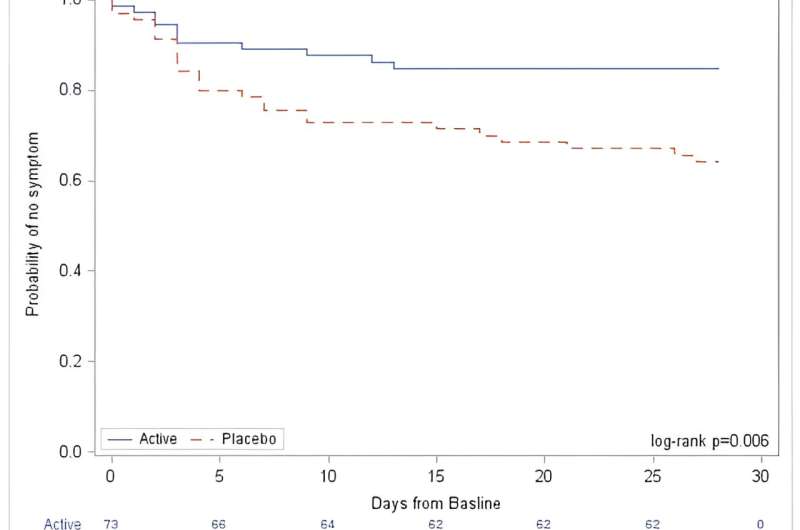This article has been reviewed according to Science X's editorial process and policies. Editors have highlighted the following attributes while ensuring the content's credibility:
fact-checked
peer-reviewed publication
trusted source
proofread
Probiotics reduce COVID symptoms and delay disease among unvaccinated

Probiotics, specifically lactobacillus, demonstrated significant ability to delay a COVID infection and reduce symptoms among a group of unvaccinated people who had been in contact with someone in their household diagnosed with COVID.
The randomized, placebo-controlled study led by Duke Health researchers suggests that probiotics could be a relatively simple and inexpensive approach to treating people after a COVID exposure.
The finding could be a timely intervention as COVID-tracking data from the Centers for Disease Control and Prevention show hospital admissions and deaths on the rise in the U.S. at the same time holiday celebrations will bring people together. Additionally, fewer than 20% of the U.S. population has received the 2023 updated COVID vaccine, according to the most recent CDC data.
"Prior to COVID, there was strong evidence that probiotics were protective against respiratory infections," said Paul Wischmeyer, M.D., associate vice chair for clinical research in Duke's Department of Anesthesiology and co-lead author of the study published in Clinical Nutrition. "Once COVID hit, it was imperative to determine whether this simple, well-tolerated intervention could be useful. Our study provides encouraging evidence for the use of probiotics."
Wischmeyer and colleagues—including co-lead author Helen Tang, a medical student at Duke, and corresponding author Anthony Sung, M.D., associate professor in Duke's Department of Medicine—launched their investigation in March 2020, prior to widespread vaccine availability in the United States. Patients were enrolled if they were unvaccinated and had been exposed to someone with COVID, but had not yet exhibited symptoms.
The study enrolled 182 participants, with half randomly assigned to take a probiotic of lactobacillus and the other half randomized to take a placebo pill. Neither study participants nor administrators knew who was receiving the active therapy.
Wischmeyer said the study enrollment period was shortened because the pool of eligible participants declined as vaccines became more commonplace and infections began leveling off prior to the delta wave.
Upon analysis, the researchers found that participants randomized to receive the probiotic were 60% less likely to develop COVID symptoms compared to those randomized to receive placebo—26.4% vs. 42.9%. The probiotic participants were also able to stave off infection longer compared to those receiving the dummy pill.
Although the probiotic group had a numerically lower incidence of COVID-19 diagnosis, the rate did not meet statistical significance (8.8% COVID diagnosis rate in probiotic vs. 15.4% COVID diagnosis rate in control group) because of the study size.
"We are actually not surprised by these findings," Wischmeyer said. "There have been several studies that have demonstrated the strong efficacy of probiotics against respiratory infections, including a very large study among babies in India that was published in Nature in 2017. Other early studies have shown that probiotics may also enhance the effect of vaccines against other viral illnesses, such as influenza."
Wischmeyer cited evidence that probiotics improve immune function in several ways, including increasing the population of regulatory T-cells, decreasing pro-inflammatory cytokines, increasing the lung's protective barrier against infection and modulating antiviral gene expression.
"While limited in sample size, our study lends credence to the notion that our symbiotic microbes can be valuable partners in the fight against COVID-19 and potentially other future pandemic diseases," Wischmeyer said. "This may be particularly relevant in under-resourced nations where vaccination rates have lagged and even in the U.S., where COVID boosters are not widely accessed."
More information: Paul E. Wischmeyer et al, Efficacy of probiotic treatment as post-exposure prophylaxis for COVID-19: A double-blind, Placebo-Controlled Randomized trial, Clinical Nutrition (2023). DOI: 10.1016/j.clnu.2023.11.043



















